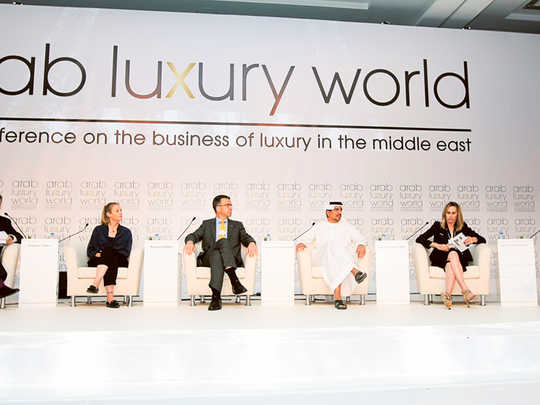
Dubai: The growth rate of the luxury retail market in the UAE is expected to slow down in the next few years compared with the last two to three years as the market matures and fluctuating oil prices force consumers to spend less, according to an industry expert.
The market is likely to grow by around 8 per cent annually in the next few years, Cyrille Fabre, senior partner and regional head of retail and consumer products practices at management consultancy Bain and Company Middle East, said by phone. He did not say how much the market had grown in the past two to three years.
According to data from consultancy Euromonitor International, the UAE’s luxury goods market was up 9 per cent to touch Dh15 billion in 2014. However, the growth rate is forecast to decline to 7.5 per cent in 2015, with the market valued at Dh16.48 billion.
“In the next few years, the market will reach a sustainable growth, but won’t be a strong growth like in last two to three years… If the oil price remains at what it is now, over time this will translate to people becoming more conservative on spending… the market will mature, so the number of stores that will open will reach a level where you don’t need to open more stores… we will see a number of malls opening in the next three years but after that less malls will be needed,” Fabre said.
The euro has been slipping against the US dollar and other currencies over the last year, falling from a high of 1.38 to the dollar in the first quarter of 2014 to 1.09 today. Global benchmark Brent oil has dropped from $115 per barrel in July to below $50 in January of this year. It has since recovered slightly to $65 this week.
In the first quarter of the current year, the growth of the country’s luxury retail market decelerated, Fabre said. This was a result of fewer Russian and Chinese visitors to the country, as well the weaker euro and strong US dollar, he said.
While spending by European visitors dropped, it was “offset by tourists from other countries, such as Australia and India,” said Nikola Kosutic, research manager for the Middle East at Euromonitor International.
He expects the luxury retail market in the country to continue to grow for the full year, driven by the country’s good retail environment, consumers’ high disposable income and rising visitor numbers.
Business at Ahmed Seddiqi and Sons, a distributor of luxury Swiss watches in the UAE, was affected earlier this year due to currency fluctuations, according to Mohammad Seddiqi, senior vice-president of sales and retail at the company.
“The weakening of the euro in the past months and the [fluctuation of] the Swiss franc has affected us at the beginning of the year a lot. But because of the fluctuation of the euro and the Swiss franc, the companies that we have been working with have been adjusting prices in the region by reducing prices of the luxury products that we are carrying and increasing the prices in Europe,” he said on the sidelines of the Arab Luxury World conference, which opened in Dubai on Monday.
However, Stephane De Palmas, general manager at luxury jeweler Tiffany and Co., expects flat performance in the luxury retail sector in the current year compared with 2014 due to currency fluctuations.
He expects new product launches to boost Tiffany and Co.’s performance this year.











